|
|
|
Sort Order |
|
|
|
Items / Page
|
|
|
|
|
|
|
| Srl | Item |
| 1 |
ID:
096055
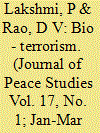

|
|
|
| 2 |
ID:
122595
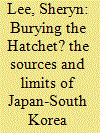

|
|
|
|
|
| Publication |
2013.
|
| Summary/Abstract |
This article critically evaluates the basis, aspirations, and prospects for bilateral security cooperation between Japan and South Korea. The assumption that common enemies, friends, and interests should have given rise to solid and steadily improving relations between Tokyo and Seoul has been far from realized. Rather, the Japan-ROK relationship continues to be marked by highly volatile behavior - ranging from intense friction to reluctant cooperation - which not only offers a vexing puzzle to the Realist school of international relations but also to the Constructivist one. This article argues that despite the perceived improvement in relations, Japan-South Korea security cooperation is situational and limited; recent developments do not imply a fundamental realignment of the two powers towards one another.
|
|
|
|
|
|
|
|
|
|
|
|
|
|
|
|
| 3 |
ID:
133422
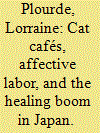

|
|
|
|
|
| Publication |
2014.
|
| Summary/Abstract |
This article examines the Japanese cat café boom, which peaked in 2009 yet remains a significant retail phenomenon throughout Japan, and in particular Tokyo. How do humans encounter animals in contemporary Japan, not as private owners and companions, but as consumers seeking direct, sensory engagement with cats at a moment of profound social and economic anxieties? Drawing on ethnographic fieldwork conducted in Tokyo, this article examines how cats have become a newly emergent commodity within the 'healing boom' that first emerged in recessionary-era 1990s Japan. Such healing commodities - therapeutic music, aromatherapy, robot interaction, among others - are designed to invoke an affective engagement with the consumer in order to cope with the uncertain and stressful conditions of life in still recessionary, and now post 3/11, Japan. I situate cat cafés within the increasing immaterialization of the economy in post-bubble Japan during which social relationships have become commodified and marketed to those who can afford it. Cats are the affective object through which patrons seek a sense of healing and relaxation.
|
|
|
|
|
|
|
|
|
|
|
|
|
|
|
|
| 4 |
ID:
134160
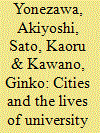

|
|
|
|
|
| Publication |
2014.
|
| Summary/Abstract |
Although the relationship between cities and universities is a commonly discussed topic, the so-called 'world class universities' and 'global cities' in East Asia do not always fit into one single cosmopolitan model. Focusing on the case of Tokyo and Japan, the authors of this paper examine the mobility patterns, academic and social lives, and gender differences of university academics as representative knowledge workers. Using original survey results, the authors first create a hierarchical structure of academic mobility patterns in Japan, and then argue that Tokyo, as the capital of Japan, is a centre of the intellectual network through its education and training function
|
|
|
|
|
|
|
|
|
|
|
|
|
|
|
|
| 5 |
ID:
150420
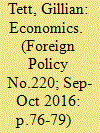

|
|
|
| 6 |
ID:
108787
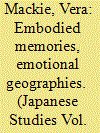

|
|
|
|
|
| Publication |
2011.
|
| Summary/Abstract |
In this article I carry out a close reading of Nakamoto Takako's book, My Diary of the Anpo Struggle (1963). Nakamoto was a writer and activist who was active in leftwing politics, the labour movement and the proletarian literature movement in the 1920s and 1930s and returned to the movement after 1945. Her published diary recounts her participation in the struggle against the renewal of the US-Japan Security Treaty and her other political activities. The book is a mixture of personal memory and political history and provides us with a distinctive 'map' of one person's emotional geography of Tokyo.
|
|
|
|
|
|
|
|
|
|
|
|
|
|
|
|
| 7 |
ID:
123491
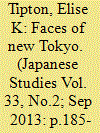

|
|
|
|
|
| Publication |
2013.
|
| Summary/Abstract |
This study focuses on a comparison of the three most popular sakariba (entertainment districts) in Tokyo of the late 1920s and 1930s to highlight the new role of leisure in everyday life as Japan industrialized and urbanized. The comparison of Asakusa, Ginza and Shinjuku shows that even as Japan became a mass society, leisure practices and patterns became stratified and diversified. This stratification and diversification reflected class, age and cultural tastes. The three sakariba developed distinctive characters and attractions for consumers, raising challenges to mass culture critics' assumption that the rise of mass culture and commodity culture would lead to homogenization of taste and recreational products and a lack of consumer choice.
|
|
|
|
|
|
|
|
|
|
|
|
|
|
|
|
| 8 |
ID:
100002
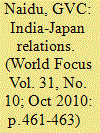

|
|
|
| 9 |
ID:
114502
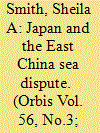

|
|
|
|
|
| Publication |
2012.
|
| Summary/Abstract |
This article offers a closer examination of the way in which the 2010 crisis emerged between Japan and China. The debate that it sponsored within Japan suggests that a crisis management initiative between Beijing and Tokyo rather than an overall reconciliation agenda may be what is now needed. The author contents that greater predictability and transparency in these maritime interactions will go a long way to developing confidence in what has to date been a very uneasy and publicly sensitive aspect of the bilateral relationship.
|
|
|
|
|
|
|
|
|
|
|
|
|
|
|
|
| 10 |
ID:
098458
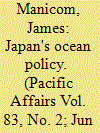

|
|
|
|
|
| Publication |
2010.
|
| Summary/Abstract |
In 2005-2006 Japan began asserting the jurisdictional rights to its maritime domain with greater authority than ever before. Tokyo prepared to conduct exploratory drilling in the disputed East China Sea and passed new laws to permit the full realization of Japan's maritime rights and responsibilities. This activist turn appears to be at odds with most explanations of Japanese strategic policy. Given its preference for strategic evolution, Japan's sudden preoccupation with the security and administration of its extended maritime zones-the Exclusive Economic Zone (EEZ) and its extended continental shelf-following years of neglect is striking. Moreover, this shift has not received a great deal of attention in the literature. This paper argues that Japan's hesitant, ad hoc and incomplete response to its changing maritime environment can be understood through Kent Calder's "reactive state" paradigm. While academic discussion of Japanese foreign policy has moved beyond the reactive state debate, Japan's approach to its ocean policy appears to fulfill both of Kent Calder's reactive state criteria. This paper analyses Japan's resistance to the expansion of state sovereignty seaward and explores how this policy inertia was exposed by China's more active maritime policy. This more assertive Chinese posture triggered the proactive turn in Japan's ocean policy, which may have negative consequences for regional security.
|
|
|
|
|
|
|
|
|
|
|
|
|
|
|
|
| 11 |
ID:
090585
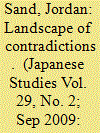

|
|
|
|
|
| Publication |
2009.
|
| Summary/Abstract |
This essay brings the issues of these two fields together to reappraise the meaning of suburban living within the mental landscape of the early twentieth-century Tokyo suburbanite. The focus is on two texts by popular novelist Tokutomi Roka, who moved to the suburban farming hamlet of Kasuya in 1907. Roka's romantic sensibility toward the landscape and his internal emotional dilemmas are interpreted as integral to one another and forming an archetypal pattern for the bourgeois male intellectual's experience of the modern suburb in Japan.
|
|
|
|
|
|
|
|
|
|
|
|
|
|
|
|
| 12 |
ID:
088121
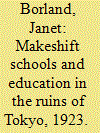

|
|
|
|
|
| Publication |
2009.
|
| Summary/Abstract |
A range of issues confronted government officials in the aftermath of the Great Kant? Earthquake, but almost immediately they began efforts to resume education. This article examines how educators overcame numerous challenges in order to recommence primary school education and return children to makeshift classrooms in the ruins of Tokyo. Education was viewed as an important means to help restore a sense of normality in the lives of displaced school children at this time of extraordinary upheaval. Educators were concerned not only with the material reconstruction and recovery of schools, but also the physical and mental recovery of children.
|
|
|
|
|
|
|
|
|
|
|
|
|
|
|
|
| 13 |
ID:
114381
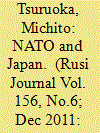

|
|
|
| 14 |
ID:
106414


|
|
|
|
|
| Publication |
2011.
|
| Summary/Abstract |
Since the beginning of the global trade in securities, bonds and currencies, three cities have emerged as the world's preeminent money centers: New York (Wall Street), London (The City) and Tokyo. They exert enormous influence on the world's economic agenda, and their cultures subtly shape the world of finance. But today, with the emergence of dynamic economies and societies in the developing world, there has emerged a host of new potential global financial centers. The list is long: Mumbai, Singapore, Hong Kong, Seoul, Dubai, Lagos, Johannesburg. None yet rivals the current
|
|
|
|
|
|
|
|
|
|
|
|
|
|
|
|
| 15 |
ID:
093798
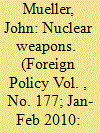

|
|
|
|
|
| Publication |
2010.
|
| Summary/Abstract |
But you might think so if you listen to world leaders right now. In his first address to the U.N. Security Council, U.S. President Barack Obama warned apocalyptically, Just one nuclear weapon exploded in a city-be it New York or Moscow, Tokyo or Beijing, London or Paris-could kill hundreds of thousands of people.And it would badly desabilize our security, our economies, and our very way of life.Obama has put nuclear disarmament back on the table in a way it hasn't been for decades by vowing to pursue a nuclear-free world, and, with a handful of big treaty negotiations in the works, he seems to think 2010 has become a critical year.
|
|
|
|
|
|
|
|
|
|
|
|
|
|
|
|
| 16 |
ID:
101260
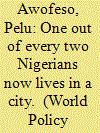

|
|
|
| 17 |
ID:
092241
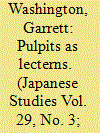

|
|
|
|
|
| Publication |
2009.
|
| Summary/Abstract |
Beginning in the 1890s, Protestant churches in Tokyo offered a new kind of social space that encouraged an open, verbal communication of ideas about a modern and improved Japan. Such churches differed dramatically from the majority of Japanese secular and religious gathering spaces that were directly influenced by their strong ties to state authority. At church, pastors and respected lay speakers told listeners to individually imagine the nation and their appropriate places within it. Speaking and listening with the men were many educated, socially minded women who had just been barred from various forms of public life. These men and women used the church space to imagine and realize alternative versions of a new Japan. To analyze the discursive distinctiveness of Tokyo's Protestant churches, this paper examines laymen's speeches made before the Women's Group of Tokyo's most socially active church, Hong?, sermons in Tokyo's two largest Kumiai (Congregationalist) churches, Hong? and Reinanzaka, and the accounts of attendees influenced by both.
|
|
|
|
|
|
|
|
|
|
|
|
|
|
|
|
| 18 |
ID:
138750
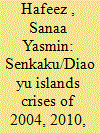

|
|
|
|
|
| Summary/Abstract |
The diplomatic situation between Japan and China over the Senkaku/Diaoyu Islands has become increasingly precarious over the past decade. Weak diplomatic ties and lack of trust between the two nations has made a clash not only more likely, but also unlikely to be effectively contained. This article compares the events and management of three diplomatic crises concerning the islands, including the deportation of Chinese activists who landed on the islands in 2004, the detention of a Chinese fishing boat captain who collided with a Japan Coast Guard vessel in 2010, and the 2012 nationalization of three of the islands by the Japanese central government. These case studies reveal the lack of reliable high-level communication mechanisms between Tokyo and Beijing, diminishing back-channel diplomacy and the asymmetrical influence of each respective Foreign Ministry as just a few of the structural barriers to effective Sino-Japanese crisis management.
|
|
|
|
|
|
|
|
|
|
|
|
|
|
|
|
| 19 |
ID:
148067
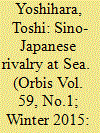

|
|
|
|
|
| Summary/Abstract |
This article contends that as Japan weakens relative to China it must think creatively about blunting key components of China's military strategy, particularly in the maritime domain. To advance this argument, this study samples recent Japanese threat perceptions of China; assesses the growing Sino-Japanese military imbalance; illustrates some asymmetric responses that may help Japan exploit its geographic advantages while competing more effectively; and identifies the risks to the proposed countermoves against China's challenge. The bottom line is that if Japan hopes to stay in the game, it must employ its military power imaginatively, making the Asian seas and airspace less and less hospitable to Chinese forces as they turn seaward.
|
|
|
|
|
|
|
|
|
|
|
|
|
|
|
|
| 20 |
ID:
098186
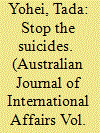

|
|
|
|
|
|
|
|